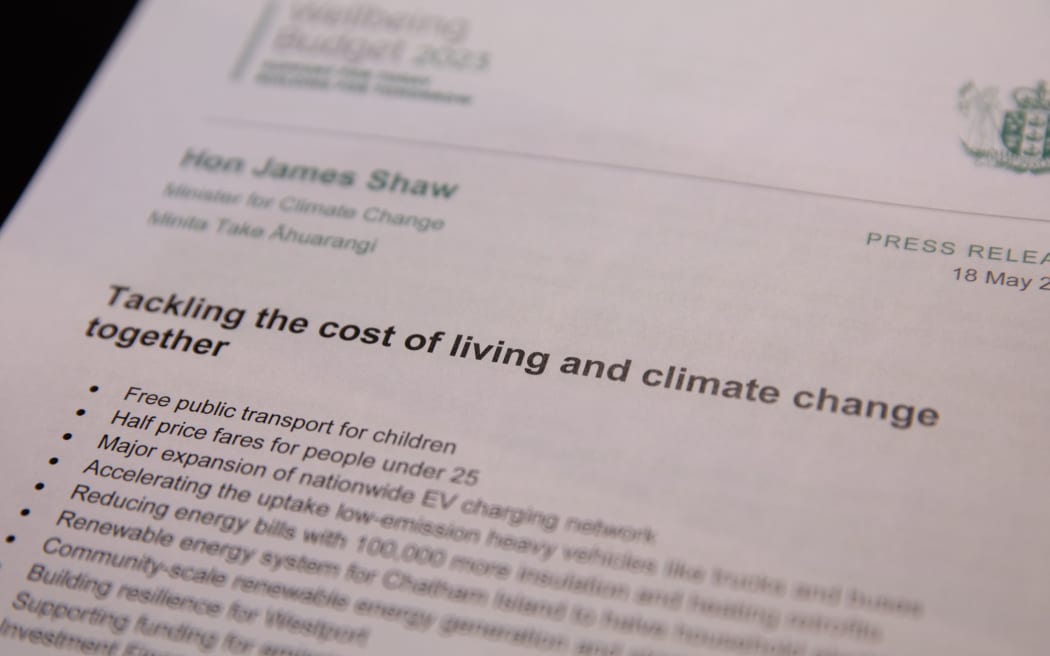
Prominent environmental groups in Aotearoa New Zealand are less than impressed with what they describe as underwhelming budget investments in climate, but an expert says the government has taken a multifaceted approach.
Among the announcements yesterday was $402.6 million to expand the duration and scope of the Warmer Kiwi Homes programme, $120 million to expand EV charging infrastructure, $100 million fund to help councils invest in future flood resilience, $24.7 million to improve data on impacts of climate change and adaptation and mitigation, and $167.4 million in building resilience to future climate events.
It came on the same day the World Meteorological Organisation said global temperatures were now more likely than not to breach 1.5 degrees Celsius of warming within the next five years.
- READ MORE: NZ’s Budget 2023 at a glance: What you need to know — full climate and science, research and technology investments
- Other NZ Budget 2023 reports
Forest and Bird said the budget did little to tackle climate change and turn around biodiversity loss.
“Keeping New Zealanders safe is clearly a ‘bread and butter’ issue, yet the government’s lack of investment in nature-based solutions is putting us all at risk,” chief executive Nicola Toki said.

“What we looked for but have not found, is meaningful investment in nature-based solutions to climate impacts. And our biggest source of greenhouse gas emissions, agriculture, has not yet been priced more than 30 years after New Zealand promised the world it would cut emissions.”
The government’s $6 billion infrastructure-focused National Resilience Plan needed to prioritise investment in areas like river catchments, forests, and wetlands — otherwise it might even affect people’s ability to get insurance in the future, Toki said.
Insulation and heating retrofits
Electricity Networks Aotearoa chief executive Richard Le Gros said the association, which represents New Zealand’s 27 electricity distribution businesses (EDBs), supported the focus in the budget on decarbonisation initiatives as well as insulation and heating retrofits.
“We welcome the government’s greater investment in public EV charging infrastructure throughout the country,” Le Gros said, adding it would help reduce household energy bills and encourage a green transition.

Greenpeace climate campaigner Christine Rose was critical of the government for missing the chance to implement radical change in farming, climate solutions, transport, and energy.
“While it’s positive to see that half-price fares remain for some, we needed bolder and more visionary strategies, including significant investment in expanding rail and making public transport fares free for all,” Rose said.
“We welcome the funding boost for home insulation and heat pumps, but are disappointed not to see significant investment in locally-owned renewable energy.
“This would end our dependence on oil, gas and coal, and also reduce the power bills of everyday New Zealanders, addressing both the cost of living and climate crisis.”
Long-term behaviour change
University of Canterbury professor Bronwyn Hayward said the budget appeared “deceptively simple” but, for example, allowing children to use public transport for free was not just about increasing bus use, it would also ease family budgets and instigate long-term behaviour change.
“Critics of the government will rightly point out there is now less money available to spend on climate resilience due to the crash in carbon pricing, and yet a sizable new spend of $1.9 billion has been allocated in this budget for climate resilience alongside the $1 billion pledged for cyclone recovery,” Hayward said.
“This, together with spending on retrofitted housing, new homes, prescription charges and school lunches all contributes to the social infrastructure that communities will badly need when facing ongoing climate risk.
“We need to join the dots when we talk about climate budgets and see how many of the wellbeing initiatives are also very real investments in climate resilient futures too.”

While making transport more equitable was important, University of Auckland School of Architecture and Planning senior lecturer Timothy Welch said the focus should also be on the infrastructure’s resilience as more intense and frequent weather events could be expected.
“New funding for maintaining public transport service and workforce development is important, but we need more funding to expand our public transport networks and help drive down transportation emissions.”
Research, science, and tech
Universities New Zealand welcomed the announcement of $55 million for research fellowships and an applied doctoral training scheme, as well as the allocation of $451 million for multi-institutional research collaboration hubs in the Wellington region focused on health and wellbeing, oceans, climate and hazards, advanced manufacturing, biotech and energy futures.
However, it said it was unfortunate to see funding for the Centres for Asia-Pacific Excellence had been discontinued.
Professor Hayward said integrating science agencies based in Wellington was important, but it omitted “arts and imagination”.

“The climate crisis will bring repeated, cascading and compounding weather events that will test our resolve and tear at the fabric of our society. These are not challenges which can be fixed by science or investment in infrastructure alone,” Professor Hayward said.
“We need the arts, alongside sciences to help imagine a low-carbon economy in fair and just ways,” she said.
“While government could justifiably argue its attention to digital screen industries is a creative investment in ‘a high-wage low emissions and creative economy’ we also need a wider vision for the deeper integration of arts and sciences, one which helps us imagine new ways we might yet flourish in a climate challenged world.”
Addressing inequities
Environmental consultant Andrea Byrom said it was heartening to see some of the tertiary investment addressing long-recognised inequities, with dedicated fellowships and awards for Māori and Pacific people and a boost to provision of Mātauranga Māori in the tertiary sector, and applied postdoctoral fellowships.
Byrom also applauded trialling apprenticeship training in the tech sector and boost to research fellowships and PhDs.
“The historical gap in funding for these types of fellowships, particularly at postdoctoral level, has resulted in much of Aotearoa New Zealand’s best and brightest talent heading offshore — sometimes never to return.
“Hopefully these fellowships will stem that flow.”
Malaghan Institute director Graham Le Gros said the investment in science and innovation recognised the sector’s value to the country’s resilience and prosperity.
“From building resilience in the face of future pandemics to investing in biotech, innovation and talent to help move New Zealand to a high-wage economy, we can rejoice in some much needed infrastructure so that all New Zealand scientists have a place to really focus their energy and attention,” Le Gros said.
“The multi-institutional research hubs will increase collaboration and productivity, allowing us to work together to tackle some of New Zealand’s most pressing challenges and opportunities.”
This article is republished under a community partnership agreement with RNZ.












































